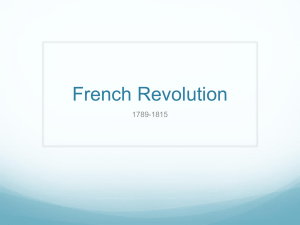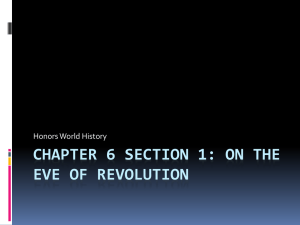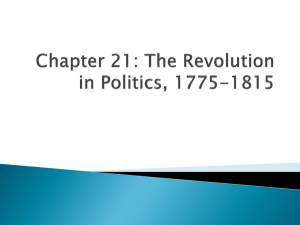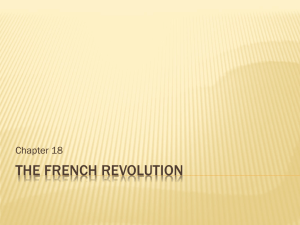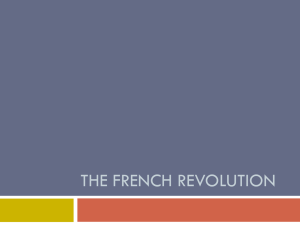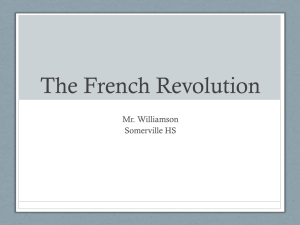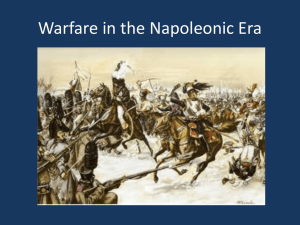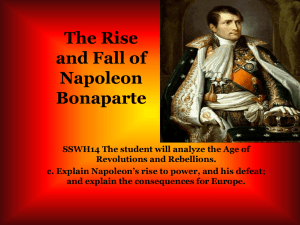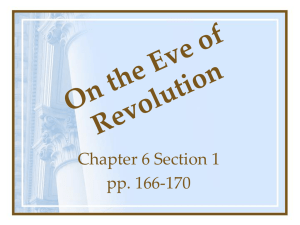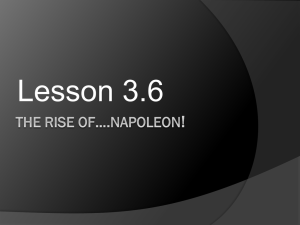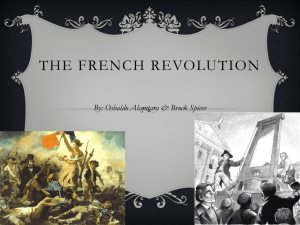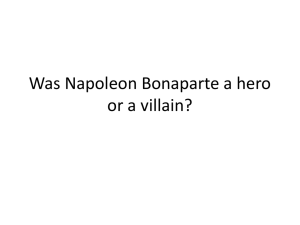The French Revolution and Napoleon
advertisement
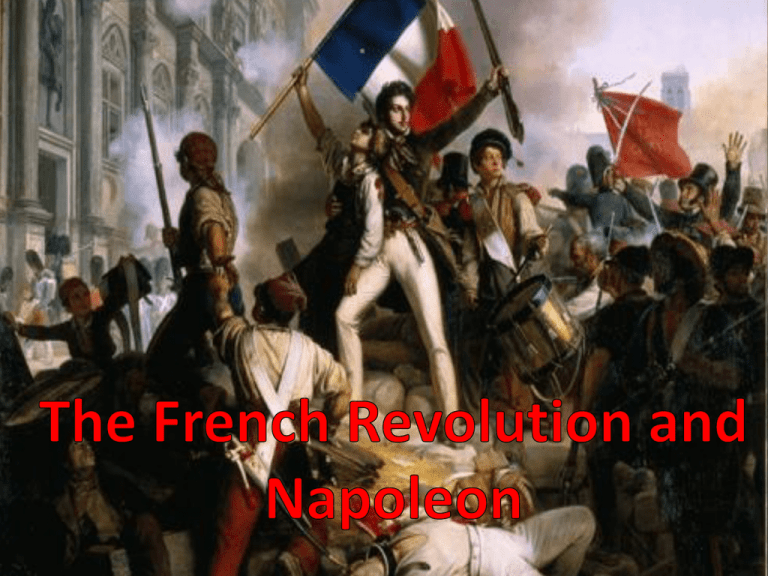
On the Eve of Revolution • 1789, France still clung to an outdated social system, from the Middle Ages • Everyone in France belonged to Three classes: Clergy Nobility First Estate 1% Second Estate 2% Third Estate 97% Majority of population: Middle Class and Peasants • First Estate – During Middle Ages the Church had great influence throughout Christian Europe – In 1789, French Clergy, still enjoyed enormous wealth and privilege, owned 10% of land, collected tithes and didn’t pay taxes • High church leaders, Bishops and abbots were usually rich nobles • Parish priests were humble and often poor – Philosophers targeted the church for reform • Church was often corrupt and interfered in politics • Clergy condemned the Enlightenment for undermining religion and moral order • Second Estate – Titled nobility of French Society – During the Middle Ages, noble knights defended the land, Louis XIV, crushed nobles military power but gave them jobs in government, the army, courts and the Church – Nobles raised taxes trying to live lavish lifestyles to keep up with everyone else – Feared losing traditional privileges, especially freedom of paying taxes • Third Estate – In 1789, numbered about 27 million people, or 97% of the population. – 10% of them were the bourgeoisie (Middle class), included prosperous bankers, merchants and manufacturers, officials who staffed royal bureaucracy, lawyers, doctors, journalists, professors and skilled artisans – 9 out 10 people in Third Estate were rural peasants • Some were prosperous land owners, others were tenant farmers and day laborers • Poorest members of the Third Estate were the city workers – Apprentices and journeymen – Women and men earned livings as servants, stable hands, porters, construction workers – Large number were unemployed, to survive many turned to begging and crime • Discontent – Members of the Third Estate resented privileges of their social “betters” – The wealthy, bourgeoisie could buy political office and titles – Urban workers couldn’t afford rising prices of bread – Peasants burdened on taxes from land to soap to salt – Enlightenment ideas led people to question the old regime – Everyone in third estate called for other estates to pay their share • Financial Crisis – Deficit spending- Government spent more money then it takes in – Louis XIV left France deeply in debt • Seven Years War and American Revolution strained the treasury • Cost rose in 1700’s, lavish court soaked up millions • Government borrowed more and more money and by 1789, half its tax income went just to pay interest on debt • Nobles and clergy still refuse to pay taxes • Crumbling Economy – General economic decline in 1770’s, bad harvest sent food prices soaring – People rioted in towns, peasants attacked noble’s manor houses • Failure of Reform – Louis XVI burdened with debt hires Jacques Necker, finical wizard, proposes idea to tax first and second estates, nobles and clergy had him dismissed – Crisis worsened, the wealthy and powerful demand that the King call the Estates General before making any changes • French Kings had not summoned the Estates General in 175 years • Estate General meets at Versailles in May 1789 – Louis XVI had all three estates prepare cahiers, notebooks listing their grieveneces – Many cahiers called for reforms ( fairer taxes, freedom of the Press, regular meetings of the Estates General) – All three estates elect delegates to represent at Estates General – Estates General would have all estates meet separately then vote, this allowed for Third Estate to be outvoted 2 to 1 – Third Estate wanted all three order to meet as one Estates General then becomes deadlocked over voting – After weeks of a stalemate, delegates of Third Estate, transformed themselves into the National Assembly (Stating that they represented the people of France) – Invited members of other Estates to help shape a Constitution – A few days later they are locked out of the meeting place Tennis Court Oath Men vow to not disband until they had drawn up a Constitution in France – Reformed clergy and nobles joined National Assembly, Louis XVI had to accept it – Royal troops arrive in Versailles • Storming of the Bastille – 800 Parisians assembled outside of Bastille (Medieval fortress used as a prison) – Crowd demanded weapons and gun powder stored there, due to the presence of the Royal Army – Commander of Bastille opened fire, many were killed, angry mob broke through, killed commander and five guards, found no weapons – Bastille Day, July 14, French National Holiday Creating a New France • The Great Fear – Peasants starved, grain prices soared, people spent 80% of income on bread – Rumors of government troops seizing crops, peasants unleashed their fury on nobles – Stole grain and burned down manors • Paris in Arms – Moderates looked to Marquis de Lafayette, aristocrat that fought with Gorge Washington in American Revolution – Lafayette headed National Guard, middle class militia, organized after presence of royal troops • Guard was first group to wear Red, White and Blue – Paris Commune • Even more radical then Guard, could mobilize quickly for protests or violent action • Liberty, Equality and Fraternity – August 4, nobles in National Assembly vote to give up rights and privileges – Assembly issues the Declaration of Rights of Man and the Citizen, document modeled after American Declaration of Independence – Each French man had an equal right to take office, freedom of religion, taxes to be levied according to ability to pay – Parisians grew suspicious as more Royal troops enter Paris • A Time for Reform – Reorganize the Catholic Church • To pay off debt Assembly voted to take over and sell Church lands • Civil Constitution of the Clergy (1790), Bishops and Priests became elected and salaried officials – Reaction was swift and angry • Many Bishops and Priests refused to accept Civil Constitution of the Clergy • Pope condemned it and conservative peasants rejected changes • Government punished Clergy who refused → Huge shift opened between the revolutionaries in Paris and peasants in pronvinces • Written Constitution – Constitution of 1791 set up a limited Monarchy in place of absolute – Legislative Assembly had power to make laws, collect taxes, decide on issues of war and piece – Abolished old provincial courts and reformed laws • Fateful Flight – King and Queen attempt to escape in disguise – When stopped in town, they were recognized, brought back to Paris, King was seen as a traitor • Reaction Outside France – Supporters of Enlightenment supported reforms of the Assembly, saw French experiment as the dawn of a new age for justice and equality – European rulers denounced French Revolution – Émigrés, nobles and clergy the fled France spread news of attacks on privileges and property – Marie Antoinette’s family in Prussia and Austria issues, Declaration of Pilnitz, threatened to intervene to protect French Monarchy • Working class men and women pushed revolution into more radical action. – 1791, demanded a republic – Wanted government to guarantee them a living wage – Legislative Assembly began developing factions • Left wing, moderates, right wing – 1792, left-wingers declare war on Prussia and Austria Radical Days • French Republic- Radicals took control of the Assembly, called for an election • Suffrage, the right to vote, was extended to all male citizens – All French men and women were called citizen • Convention put Louis XVI on trial – January 1793 Louis XVI beheaded – October 1793 Marie Antoinette beheaded – Son Louis XVII died of unknown causes in a dungeon • 1793, France was at war with most of Europe – Britain, Holland, Spain, Austria and Prussia • To deal with threats to France the Convention created the Committee of Public Safety – 12 member committee had almost absolute power, battled to save Revolution – Prepared France for all out war – Developed new war tactics to win battles with masses of ill trained, patriotic forces • French armies overran Holland and invaded Italy • Robespierre – Government battled antirevolutionaries under guided hand of Robespierre • Lawyer/Politician, rose to leadership in the Committee of Public Safety – Selfless dedication to the Revolution, believed France could achieve a “Republic of Virtue”, through terror – Reign of Terror- 1793-94Revolutionary Courts conducted hasty trials – 40,000 people died – Guillotine developed as a human method of behading – Convention turned on itself, leaders, including Robespierre were tried and beheaded, excutions then slowed • Reaction and the Directory – Made 3rd Constitution (1795) • Set up of five man directory and two house legislature, elected by male citizens with property – Directory held power from 1795-1799 • Faced growing discontent, leaders lined their own pockets, failed to solve problems, chaos spread – Politicians turned to military hero, Napoleon Bonaparte, to help them advance their goals – BACKFIRED, Napoleon would outwit them and become ruler of France – Nationalism- An aggressive feeling of pride and devotion to one’s country, developed due to the Revolution and war Age of Napoleon • Born on French ruled island of Corsica, in Mediterranean • Came from little money, minor nobles, at age 9 sent to France to be trained in military career. • Favored Republic rule but found revolution confusing • Early Successes – Rose quickly in the army, in 1793 drove British forces out of French Ports. – Won several victories against Austrians, capturing Northern Italy. – By 1799 moved from victorious general to political leader – Overthrew the weak directory, set up Three man governing board, the Consulate, made another Constitution, Napoleon took title of First Consul – In 1802, had himself named Consul for LIFE • Self-Made Emperor – 1804, Napoleon accumulated enough power to the title of Emperor of France. – Held a plebiscite, ballot in which voters say yes or no to an issue • Each time the French strongly supported him – Consolidated power, strengthening the central government • Reforms – Modernized finance-Regulated the economy to control prices, encourage new industry and build roads and canals – Made peace with Catholic Church – Encouraged émigrés to return, provided they took an oath of loyalty – Peasants were allowed to keep land purchased from nobles during the Revolution – Made all careers open to talent • Napoleonic Code – Religious toleration, equality of all citizens before law, advancement based on merrit • Empire – 1804-1814, Napoleon marched all over Europe, victories • Developed new battle plans for each battle, so opposing generals could never anticipate what he would do next – Napoleon redrew the map of Europe, he annexed or added outright some areas to France, including Holland, Belgium, parts of Italy and Germany • Abolished the weak Holy Roman Empire • The rulers of Austria, Prussia, and Russia reluctantly signed treaties with Napoleon • Put friends and family members on thrones of Europe – Removed King of Spain from throne and put in his brother – Divorced wife, Josephine, married princess of Austria – Claimed Kingship to ancient ruling families • France vs. Britain – Napoleon attempted to take Britain but their small naval fleet won – Turned to economic warfare • Closed European ports to British goods • Britain then set up own blockade, shutting off ports to keep people or supplies from moving in or out • Both Britain and France seized neutral ships, suspected of trading with other side – British attached America ship, caused War of 1812 – Napoleon failed to bring Britain to its knees – Restrictions hurt Europe, created a scarcity of goods and sent prices soaring, resentful merchants turned to smuggling Challenges to Napoleon’s Empire • French armies spread ideas of Revolution across Europe – Installed reforms in other countries • Opened careers to men of talent across Europe (Napoleonic Code was carried across Europe when he took over a country) • Nationalism in other countries , unleashed revolts against the French • Resistance in Spain – Napoleon and his brother undermined Catholic church – Spanish resisted French invaders and Napoleon responded with brutal repression – Spanish patriots conducted, guerilla warfare, hit and run raids, against the French – Attacks kept large number of French troops tied down in Spain – British sent troops to help Spain • Defeat in Russia – Despite some defeats Napoleon continued – In 1812, Alexander I of Russia, resigned from Continental System, Napoleon responded by making the Grand Army, 600,000 soldiers from France and other countries – Russians retreated eastward to avoid battles, burning crops and villages as they retreated • Leaving the French hungry and cold – In September Napoleon reached Moscow, realized he couldn’t feed and supply army through long Russian winter, retreated in October – 1,000 mile retreat turned into desperate battle to survive, only 100,000 soldiers in Grand Army survived • Downfall of Napoleon – Russia, Britain, Austria, and Prussia formed an alliance to beat weakened France – In 1813, they defeated Napoleon at the battle of Leipzig, the next year Napoleon abdicated (stepped down from power) – He was exiled to Elba, island on the Mediterranean – Louis XVIII, brother of Louis XVI becomes King of France • Napoleon Returns!!!! – Restoration of Louis XVIII didn’t go well – Émigrés rushed back to France seeking revenge, rekindling loyalty for Napoleon – Victorious allies gathered in Vienna for peace conference, Napoleon escapes exile and returns to France – Citizens cheered Napoleon’s advance, Louis XVIII leaves France – March 1815, Napoleon is Emperor in France again, only lasts 100 days, until allies assemble their forces – Opposing armies met in Waterloo, Belgium, Napoleon was defeated, sent to exile in St. Helena, never to return – Napoleon died in 1821 • Legacy of Napoleon – Impact on France lived on – Made France a centralized state with a Constitution – Held elections, citizens had more rights to property – Sparked nationalist feelings across Europe – Ended Holy Roman Empire, allowing for creation of new Germany – Sold Louisiana territory to American Government, doubling size of United States, allowing for American Expansion • Congress of Vienna – After Waterloo diplomats met for 10 months • Lots of entertainment and dances • Vienna Settlement – Decisions of the diplomats of Europe, set the stage for European policy for the next 100 years – Re-drew the map of Europe, to contain French ambitions – Ringed France with strong countries • In North added Belgium and Luxemburg to Holland to make Kingdom of the Netherlands • To prevent eastward, gave Prussia land along the Rhine, allowed Austria to control Northern Italy again • Stability- Promoted principal of legitimacy-restoring hereditary monarchies tat the French Revolution or Napoleon unseated • Leaders pledged to maintain order in Europe • Problems with Peace – Vienna Congress achieved immediate goals, failed to see how nationalism would shake foundations of Europe – They re-drew the boundaries without concern for national cultures

